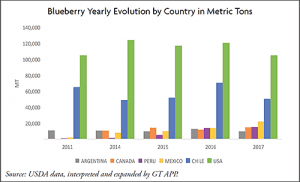Just as blueberry consumption continues to rise in the U.S. market, the flavor, versatility, and healthful properties of blueberries are appreciated around the world.
The United States remains the global leader for blueberry imports, but its share has fallen from 69 percent in 2011 to 59 percent in 2016 according to data from the United Nations Food and Agriculture Organization.

The decrease comes despite an overall increase in total worldwide blueberry imports—up 70 percent from 2011 to 2016—and this is due to shipments going to other countries around the world.
Several European countries are claiming more imports like Germany (1.6 percent), France (2.3 percent), and Spain (12.3 percent), while U.S. neighbor Canada has also registered an increase in shipments (1.6 percent).
Although the Netherlands and Portugal ship blueberries to the United Kingdom, Germany, and Spain, supply has been augmented by exports from both Chile and Peru. The market for blueberries has also been expanding in Asia, including both India and China, though phytosanitary certification can be problematic for newcomers to the market.
China’s per capita consumption of blueberries is 3.7 grams per year, compared to 1.5 kilograms in the United States. Chilean exports to China and more recently India (since September 2017) have proven somewhat difficult as freight is very expensive for the volume exported.
Despite these problems, Chilean blueberries are gaining popularity and tonnage to China has surged 289 percent since 2010. Peru has more limited production than Chile and plants mostly the Biloxi variety.
Biloxi berries are regarded as less sweet, do not travel great distances well, and thus are not highly valued in Asia. Just last year, however, Peru signed an agreement with a Shanghai freight company to send blueberries by air to China and is hoping to catch up to Chile.


